As we grow older, staying active and engaged becomes just as important as receiving compassionate, high-quality care. At Oxford House thoughtfully planned activities form an essential part of everyday life, offering much more than entertainment. They bring structure, comfort and, most importantly, a sense of purpose. Whether it’s a peaceful afternoon of painting, a lively sing-along, or a gentle stroll through the garden, these moments help residents remain connected to themselves, their peers, and the world around them.
Meaningful activity is far more than a way to fill the day, it’s a key element of person-centred care. For residents, particularly those living with mobility challenges or long-term health conditions, engaging in purposeful activities provides structure, independence and a sense of belonging. When programmes are thoughtfully planned and delivered with empathy, they can enhance both mental and physical health, while nurturing self-esteem and emotional wellbeing.
Care home activities aim to improve quality of life by preserving dignity, autonomy and joy in daily living. Each resident’s participation, however small, helps strengthen their confidence and identity within the community. Many residents have experienced periods of isolation before moving into care, sometimes following the loss of a partner or friends. Group activities such as music sessions, crafts or shared exercise provide a wonderful opportunity to build friendships, stimulate conversation and combat loneliness.
Our activities coordinators, Aqeela and Amna, play a vital role in creating a diverse calendar that appeals to all interests and abilities. By offering arts and crafts, reminiscence sessions, or even seated exercise classes, they help residents stay mentally stimulated and emotionally fulfilled. These interactions, no matter how brief, contribute to a wider sense of community and belonging.
The Benefits of Staying Active: Indoor and Outdoor Activities
While social and emotional benefits are essential, physical wellbeing remains equally important. Even gentle activity, such as light stretching, dance, or tailored movement sessions, helps maintain mobility, boost circulation and strengthen muscles. Staying active also supports better sleep, improves heart health and lowers the risk of falls, dementia and other age-related conditions.
Exercise sessions designed specifically for older adults, including chair-based workouts or low-impact yoga, ensure that every resident can participate safely. These activities not only promote movement but also spark laughter and connection, reminding everyone that exercise can be both fun and rewarding.
Indoor activities bring opportunities for residents to express themselves creatively while supporting fine motor and cognitive skills. From painting and flower arranging to quizzes, these experiences provide both relaxation and stimulation. Additionally, encouraging residents to reconnect with lifelong hobbies helps maintain identity and builds confidence.
Memory-focused sessions, such as reminiscence therapy, can also be deeply beneficial. By revisiting cherished memories through photos, songs or familiar scents, residents can strengthen cognitive function and feel reassured by the familiarity of their past.
Time spent outdoors offers invaluable benefits for both mind and body. Fresh air, sunlight and the natural environment help reduce stress and anxiety while improving mood and energy levels. Outdoor activities might include gentle gardening, walking clubs, or simply enjoying tea on the patio.
Tailoring Activities to Individual Needs
The most effective care home activities are person-centred, carefully designed around each resident’s life story, preferences and abilities. Some people may flourish in group settings, while others prefer quiet, one-to-one engagement. Activities coordinators often collaborate with residents and families to develop experiences that feel personal, comforting and meaningful.
According to the National Institute for Health and Care Excellence (NICE), meaningful activities plays a vital role in supporting the wellbeing of older adults. It provides emotional fulfilment, improves physical health, and reinforces a sense of value and independence. Conversely, a lack of purposeful engagement can lead to isolation, restlessness and cognitive decline. Ultimately, activities in nursing homes are about much more than keeping residents occupied, they’re about enriching lives.
